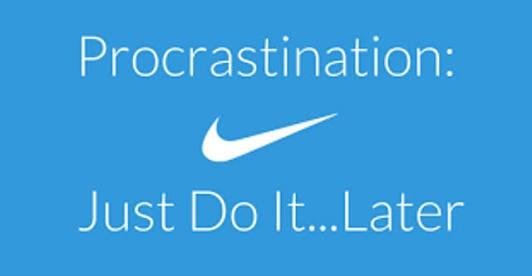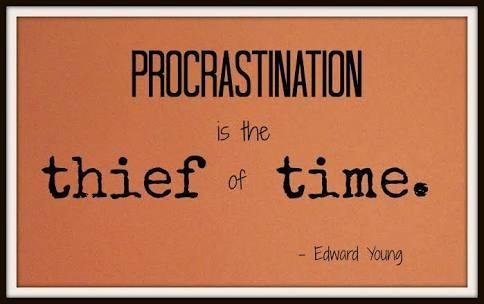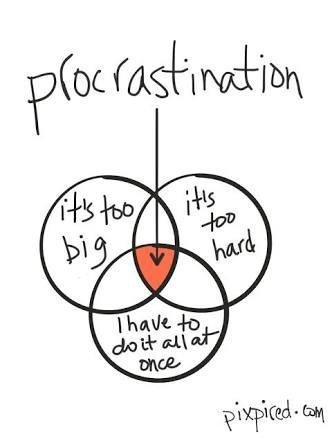Procrastination! The delay of achieving goals.
What is Procrastination?
Human beings have been procrastinating for centuries. The problem is so timeless, in fact, that ancient Greek philosophers like Socrates and Aristotle developed a word to describe this type of behavior: Akrasia.
Here's a modern definition:
Procrastination is the act of delaying or postponing a task or set of tasks. So, whether you refer to it as procrastination something else, it is the force that prevents you from following through on what you set out to do. 
Why Do We Procrastinate?
Ok, definitions are great and all, but why do we procrastinate? What is going on in the brain that causes us to avoid the things we know we should be doing?
The best way to understand this is by imagining that you have two selves: your Present Self and your Future Self. When you set goals for yourself — like losing weight or writing a book or learning a language — you are actually making plans for your Future Self. You are envisioning what you want your life to be like in the future. Researchers have found that when you think about your Future Self, it is quite easy for your brain to see the value in taking actions with long-term benefits. The Future Self values long-term rewards. 
However, while the Future Self can set goals, only the Present Self can take action. When the time comes to make a decision, you are no longer making a choice for your Future Self. Now you are in the present moment, and your brain is thinking about the Present Self. Researchers have discovered that the Present Self really likes instant gratification, not long-term payoff.
So, the Present Self and the Future Self are often at odds with one another. The Future Self wants to be trim and fit, but the Present Self wants a donut. Sure, everyone knows you should eat healthy today to avoid being overweight in 10 years. But consequences like an increased risk for diabetes or heart failure are years away.
How to Stop Procrastinating Right Now
There are a variety of strategies we can employ to stop procrastinating. Below, I'll outline and explain each concept, then I'll provide you with some examples of strategy in action.
Option 1:
Make the Rewards of Taking Action More Immediate

If you can find a way to make the benefits of long-term choices more immediate, then it becomes easier to avoid procrastination. One of the best ways to bring future rewards into the present moment is with a strategy known as temptation bundling.
Temptation bundling is a concept that came out of behavioral economics Simply put, the strategy suggests that you bundle a behavior that is good for you in the long-run with a behavior that feels good in the short-run.
Option 2:
Make the Consequences of Procrastination More Immediate

There are many ways to force you to pay the costs of procrastination sooner rather than later. For example, if you are exercising alone, skipping your workout next week won’t impact your life much at all. Your health won’t deteriorate immediately because you missed that one workout. The cost of procrastinating on exercise only becomes painful after weeks and months of lazy behavior. However, if you commit to working out with a friend at 7 a.m. next Monday, then the cost of skipping your workout becomes more immediate. Miss this one workout and you look like a jerk.
Another common strategy is to use a service like Stickk to place a bet. If you don't do what you say you'll do, then the money goes to a charity you hate. The idea here is to put some skin in the game and create a new consequence that happens if you don't do the behavior right now.
Option 3:
Design Your Future Actions

One of the favorite tools psychologists use to overcome procrastination is called a “commitment device.” Commitment devices can help you stop procrastinating by designing your future actions ahead of time.
For example, you can curb your future eating habits by purchasing food in individual packages rather than in the bulk size. You can stop wasting time on your phone by deleting games or social media apps. (You could also block them on your computer.)
Similarly, you can reduce the likelihood of mindless channel surfing by hiding your TV in a closet and only taking it out on big game days. You can voluntarily ask to be added to the banned list at casinos and online gambling sites to prevent future gambling sprees. You can build an emergency fund by setting up an automatic transfer of funds to your savings account. These are all examples of commitment devices that help reduce the odds of procrastination.
Option 4:
Make the Task More Achievable

As we have already covered, the friction that causes procrastination is usually centered around starting a behavior. Once you begin, it’s often less painful to keep working. This is one good reason to reduce the size of your habits because if your habits are small and easy to start, then you will be less likely to procrastinate.
One of my favorite ways to make habits easier is to use The 2-Minute Rule, which states, “When you start a new habit, it should take less than two minutes to do.” The idea is to make it as easy as possible to get started and then trust that momentum will carry you further into the task after you begin. Once you start doing something, it’s easier to continue doing it. The 2–Minute Rule overcomes procrastination and laziness by making it so easy to create a healthy habit.
Making your tasks more achievable is important for two reasons.
Small measures of progress help to maintain momentum over the long-run, which means you’re more likely to finish large tasks.
The faster you complete a productive task, the more quickly your day develops an attitude of productivity and effectiveness.
https://steemit.com/christianity/@bible.com/verse-of-the-day-revelation-21-8-niv
Hey, I read the post, and it seems that this post somehow matches to my theory. I don't know whether you like it or not but still, listen.
there are two things present in us
one is our soul
which tell us about the right things
and the other is our brain which tends to mess up with the things.
so whenever we're going to do something... our brain will tell us to have some rest and procrastinate
now it's our duty to spot, when our brain is messing up
once we master that
we will be able to take massive action for the success
that's it.
Wow thanks really.its uplifting
you're welcome bro